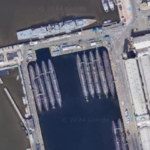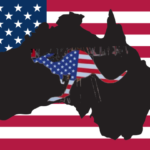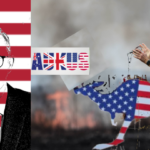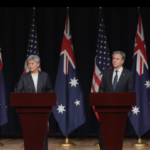Making “Australia a Global Nuclear Waste Dump”: Senator Shoebridge on Labor’s Latest Betrayal
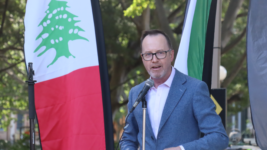
In passing the Australian Naval Nuclear Power Safety Bill 2024 on Thursday last week, the Albanese government quietly got a proposition over the line in this country that had been resisted for decades and that was in the passing of laws that facilitate the imposition of nuclear waste dumps.
Greens Senator David Shoebridge stepped out of the chamber to announce this straight after the bill had passed and he decried the fact that both majors shut down debate on the divisive laws and then promptly jammed them through with bipartisan approval.
Of course, the official line is that the nation needs to be able to store its own nuclear waste that will be produced by the eight nuclear-propelled submarines the AUKUS Pillar I provides that the nation will be receiving over the next four decades or so. However, this acquisition is not guaranteed.
And as Shoebridge has made clear in his campaigning against turning this continent into a site for nuclear waste dumps, the framework that’s been enacted provides that the US and the UK will be dumping their nuclear waste at multiple sites here and other nations could join in the future.
AUKUS dumping ground
Defence minister Richard Marles explained on introducing the laws into parliament that they’re the “second legislative step of Australia’s conventionally armed, nuclear-powered submarines”, and the laws are “specifically focused on… ensuring Australia maintains the highest nuclear safety”.
Under the new laws, regulated activities – nuclear facility, submarine and material activities – are regulated to “designated zones”. Two such zones have already been passed into law, one in WA and the other in SA, while a designated zone can further be any other area in Australia that’s chosen.
The bill also establishes NNP (naval nuclear propulsion) facilities, which are purpose-built facilities for constructing AUKUS submarines and they will further serve as radioactive waste management facilities as well. And this will all be taking place within the designated zones.
And besides a last-minute amendment to prevent the disposal of spent fuel from a submarine that is not Australian, Shoebridge warns that the major parties have swung open the door for this nation to take on the low, intermediate and high-level nuclear waste of the US and the UK going back years.
Opening the floodgates
As the senator explained in an interview in April, despite the US and the UK having nuclear industries going back half a century, neither of them have come up with a permanent solution for their high-grade military nuclear waste. Indeed, the US has only managed this for their intermediate range.
In addressing the 53rd weekly protest for Palestine and now Lebanon on Gadigal land in Sydney last weekend, Shoebridge further warned that the tone of the federal Liberal opposition has become ever more warlike of late, in terms of its support for Israel, which is ensuring Labor slides to the right.
Sydney Criminal Lawyers spoke to Greens Senator David Shoebridge about his insistence that the nation is not yet bound to AUKUS, although it’s getting quite close, as well as the implications of the imposition of nuclear waste dumps and his warning about the Coalition’s new low in war posturing.
Senator Shoebridge, the Australian Naval Nuclear Power Safety Bill skipped through the Senate last Thursday with bipartisan approval.
And as you’ve pointed out, despite the title of the bill suggesting the legislation propagates safety around nuclear energy on this continent, it appears to do the opposite.
So, how would you describe what the Albanese government has done in passing this bill with full support from the Coalition?
What we saw was Albanese, Labor and the Dutton Coalition join up to do what’s known in parliamentary terms as a guillotine: to just ram this through parliament without any debate. And this is after a year of community resistance.
This is purely designed to make AUKUS work, to make Australia a global nuclear waste dump, starting with waste from the UK and US nuclear submarines.
This is going to be arriving in a town or city near you, in the next few months and years because of this legislation they rammed through.
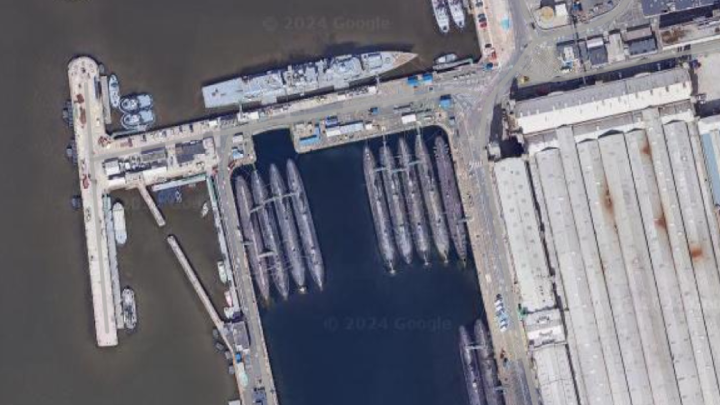
So, are you talking about the waste involved with those decommissioned submarines just sitting in ports in the UK, with nowhere for their waste to be stored locally, that you pointed to during an interview earlier this year?
In the next few years, we’re going to be receiving nuclear waste from visiting US nuclear submarines, which can do repairs, starting first at Garden Island off the coast of Fremantle, but also, at Osborne Naval Facility, just south of the Adelaide CBD.
This law greenlights working on those nuclear submarines at both of those facilities and then receiving and storing waste.
But it also means taking waste from those decommissioned UK and US submarines, and they’ve each got dozens and dozens of old submarines rusting away.
It allows nuclear waste from any of those decommissioned submarines to be brought to Australia.
The only thing they can’t bring here from the thousands and thousands of tonnes of nuclear waste that has been generated is the spent nuclear fuel from any of their nuclear submarines.
The other thousands and thousands of tonnes of highly irradiated waste can be brought over at that time.
So, what is the difference between the waste? Why aren’t we taking spent fuel but everything else?
This is an amendment that we forced on the Albanese government, together with the community, who said, “Why are we bringing over any nuclear waste from any foreign submarine?”
To try and meet that criticism, the Albanese government put up this half-baked amendment that said Australia wouldn’t take the nuclear fuel, but every other part of the nuclear waste cycle can be imported into Australia and dumped here forever.
We are talking thousands of tonnes of potential nuclear waste.
I know there had been talk about storing low and intermediate-grade nuclear waste on Garden Island, but I had thought high-grade waste needed to be stored elsewhere.
In the case of Garden Island and the facility south of Adelaide, will these just be taking low and intermediate-grade waste for storage, leaving high-grade waste to be stored elsewhere on the continent?
This bill, as soon as it passed through parliament and got the royal signature, actually created two nuclear waste zones, or they’re called designated zones under the bill.
One is on Garden Island, just a few miles off the coast of Fremantle in Western Australia, and one is the Osborne Naval Facility, which is just a few kilometres south of the Adelaide CBD.
What this law says is pretty much any activity related to nuclear submarines can be carried out at either of those sites.
That is maintenance, repair work, it is the building of nuclear submarines and it’s also the storage of nuclear waste.
Now, the bill has no limits on what waste can be stored at those facilities. It can be high-level, intermediate or low-level nuclear waste, the only small saviour that we got was that they can’t store spent nuclear fuel from the UK and US submarines.
But each of these facilities has been greenlighted to receive the highest level of nuclear waste: highly irradiated nuclear waste from any future Australian submarines and all other nuclear waste from UK and US submarines.
And is that temporary storage for all those levels of nuclear waste?
This is not temporary. This is a permanent facility at each of these sites. The government has tried to put some spin on this by saying that it would just be temporary to the people of Fremantle and Adelaide.
“Don’t worry about it. It will just be temporary”.
But I can take anybody to the ANSTOW nuclear facility in Sydney, where for the past seven decades, they’ve been temporarily storing nuclear waste at that facility.
You can go to pretty much any nuclear facility in the UK and the US, and for decades and decades and decades, things that were designated as temporary are basically permanent storage solutions because nobody has a permanent solution to toxic nuclear waste that is going to be lethal to humans for thousands, sometimes hundreds of thousands of years.
Most of the nation appears to be oblivious to the fact that Australia could soon be constructing nuclear waste dumps on First Nations land.
So, how do you consider the way in which the Albanese government has approached the imposition of nuclear waste dumps in respect of the constituency? And further how has its form been in regard to the “free, prior and informed consent” of First Nations people?
What the Albanese government has done – and they’ve held Peter Dutton’s hand on this journey all the way through – is work around decades and decades of First Nations resistance to nuclear waste dumps and ram this legislation through under the shadow of AUKUS.
I can tell you now, there are people inside Defence, and there are people inside Labor and the Coalition, who desperately want to turn nuclear waste dumps into broader civilian waste dumps and really use this to open up the nuclear industry across this country.
It has been deceitful from day one. When we pointed out last year that the legislation, as initially drafted, allows for the importation of any nuclear waste, even the high-level waste, which is the equivalent of weapons-grade uranium from the UK and US subs, we were attacked by defence minister Marles.
The minister called it a “Green conspiracy” when we pointed out that the law provided that. We won that argument. He had to concede that the bill, as it was drafted, allowed for any nuclear waste and that is partly why we got that amendment up to at least exclude one form of nuclear waste: nuclear fuel.
But from day one it has been deceitful. From day one it has been a stalking horse, using the cover of AUKUS to literally open up this country for the dumping of a global nuclear waste stream.
As more people find out about what this is, people are getting angrier and angrier, but we need to convert that into political mobilisation to undo this.

You spoke at the 53rd weekly Gaza genocide protest on Sunday on Gadigal land in Sydney and you mentioned recent toxic developments in Australian federal politics.
One of these developments seems to involve the Coalition insisting of late, that the Albanese government has been too soft on Gaza.
The reason this is difficult to hear is that people at the rallies have been criticising Albanese and Wong’s form on Israel in the Gaza Strip for the past year as being too supportive of Israeli atrocities.
Can you talk about what’s going on in regard to major party politicians and their stance on Gaza?
What we have seen over the last 12 months is the Coalition increasing bellicose, increasingly unrestrained by international law or traditional standards of humanitarian law and become closer and closer to the position of the Netanyahu war cabinet.
That is an incredibly dangerous and reckless place for an Australian political party to be. But then we’ve also seen them dragging the Albanese government to the right in their wake.
There has been a long pattern of this: of Labor following the Coalition off to the right on refugees, on AUKUS, on international relations and it is incredibly dangerous for the country.
One of the reasons it’s been critical to at least have fifteen Greens in the federal parliament is there is some anchoring of our national debate in international law, following the rulings of the ICJ, understanding that there are meant to be overriding prohibitions about what can and can’t be done even in military conflict.
It seems both Labor and the Coalition have totally lost that underpinning of principle in international law.
And lastly, when the bill had just been passed in the Senate last week, you raced out of the chamber to announce this development on social media.
You said, “there is a nuclear waste dump coming near you, unless we continue this struggle to knock off AUKUS and reverse this appalling legislation that they’ve just rammed through”.
So, Senator Shoebridge, despite the full throttle AUKUS developments that the constituency has been subjected to since March 2023, you’re continuing to say that there is a way out of AUKUS and the imposition of these nuclear waste dumps?
If we get to a dystopian future, where we start receiving thousands of tonnes of other countries’ nuclear waste, there will be no path back from that. They will never accept that waste back.
That’s the kind of cruel bargain that the Albanese government is opening up.
I say this especially for First Nations peoples, who have been protecting this continent for tens of thousands of years. This is a particularly cruel bargain that the Albanese government is opening up.
I remain incredibly hopeful that the Australia public are increasingly seeing this for what it is.
Each time political support for AUKUS is tested, it falls and falls. And that is because people can see that we have a political class in both the Labor Party and the Coalition, who are willing to sell out our national interest – poison our land, poison our water – because they’re so keen to follow the US lead and be seen as a sub-imperial power, as a deputy sheriff, they can rely upon.
This latest piece of legislation, that opens up this country to the dumping of US and UK nuclear waste, is just the most recent example of that surrender of our sovereignty: the surrender of our national interest to these so-called great powerful friends.
It is an incredibly dangerous pathway, but it is one that we can still step aside from.


